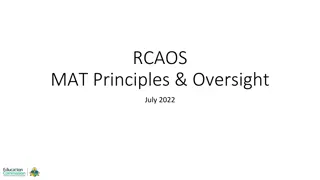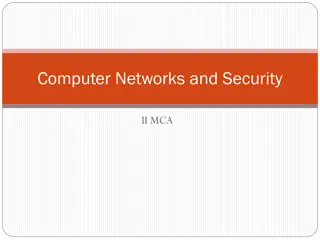Principles of the Ghana Civil Service Code of Conduct
The Code of Conduct for the Ghana Civil Service, outlined by Elizabeth Obeng-Yeboah, emphasizes principles such as abiding by the constitution and laws with dignity, integrity, and professionalism. It sets standards for conduct, avoiding conflicts of interest, maintaining political neutrality, and u
1 views • 34 slides
Advocating Together for Academic Freedom - Importance and Principles
Advocating for academic freedom is crucial for the advancement of knowledge and quality education. The American Association of University Professors (AAUP) champions academic freedom, shared governance, and economic security for faculty members. The 1940 Joint AAUP/AAC&U Statement of Principles on A
4 views • 14 slides
Academic Freedom and Shared Governance in Higher Education
Academic Freedom and Shared Governance are foundational principles advocated by the American Association of University Professors (AAUP) to ensure educators have the freedom to explore, research, teach, and discuss without censorship. These principles empower educators to enhance student learning an
0 views • 9 slides
Essential Principles of Management Discussed in Seminar
Explore the foundational principles of management discussed in a seminar on principles of management. Delve into topics such as division of work, authority, discipline, unity of command, and unity of direction as outlined by Henri Fayol. Gain insights into the importance of these principles for effe
1 views • 22 slides
Introduction of Electrical Transmission Braking Systems Workshop
The Special Interest Group on electrical braking systems is hosting a workshop to discuss the drafting principles, terminology, and indicators related to electrical transmission braking systems. The workshop aims to identify safety critical elements, propose amendments to UN Regulations, and make re
6 views • 29 slides
Principles of Architecture: Unity, Contrast, Mass Composition
Explore the fundamental principles of architecture focusing on unity, contrast, and mass composition. Unity emphasizes harmony among building elements, contrast adds interest without disrupting unity, and mass composition involves arranging shapes in a harmonious way. Proportion and scale play key r
0 views • 24 slides
International Law of War: Nuremberg Principles and Accountability
The Nuremberg Principles, derived from the trials of Nazi officials for war crimes, establish accountability in international law. These principles hold individuals responsible for committing acts considered crimes under international law, regardless of their position or orders received. The assumpt
2 views • 22 slides
Promoting Ethical Principles in Social Science Research
Explore the challenges and strategies for translating and applying ethical principles, especially in emergency contexts. Learn key questions in social science research and how to ensure information contributes to community actions. Understand the importance of considering ethical principles in all w
0 views • 21 slides
Evolution of Ethical Principles in Medical Research: A Historical Perspective
Explore the evolution of ethical principles in medical research, from the pioneering works of Hippocrates and Edward Jenner to the post-WWII establishment of principles like voluntary informed consent. Learn about key events such as the Thalidomide scandal and the development of the Declaration of H
1 views • 10 slides
Ethical Considerations in School Psychology: Navigating Codes and Principles
Explore ethical considerations in school psychology, encompassing ethical codes, legal requirements, and professional principles to address dilemmas and promote integrity. Gain insights into key ethical codes, legal mandates, and overarching ethical principles relevant to school psychologists' pract
1 views • 31 slides
Ethical Principles and Research Misconduct in Clinical Research
This session discusses the essential ethical principles governing clinical research, including respect, justice, beneficence, autonomy, and non-maleficence. It explores key documents like the Belmont Report, Nuremburg Code, and Declaration of Helsinki, emphasizing the importance of ethical conduct i
0 views • 55 slides
Study Guide for Principles of Management Course at Africa Research University (ARU)
Welcome to Africa Research University (ARU)! This study guide is designed to help you navigate through the Principles of Management course (Course Code: PRM4) at ARU. It provides an introduction to the course content, emphasizing the importance of developing management skills to effectively lead and
1 views • 40 slides
Key Principles of Insurance Explained with Visuals
Understanding the principles of insurance is crucial for both insurance seekers and companies. The principles include Utmost Good Faith, Insurable Interest, Indemnity, Contribution, and Subrogation. These principles ensure transparency, fairness, and protection for policyholders. Visual representati
0 views • 6 slides
Key Principles of Community Development
The principles of community development emphasize the recognition of community members' dignity, active participation, self-help, self-determination, and addressing felt needs. These principles stress the importance of respecting the community's resources, involving community members in decision-mak
2 views • 10 slides
Key Principles of Insurance
Understanding insurable interest, utmost good faith, and material facts disclosure are essential principles in the insurance industry. Insurable interest requires a financial stake in the insured property, utmost good faith mandates honesty in the contract, and material facts disclosure ensures all
0 views • 22 slides
Principles of Training: Overload, Specificity, and Progression
Principles of training encompass overload, specificity, and progression. Overload requires doing more than usual, specificity involves tailored activities, and progression ensures gradual advancement. These principles are vital for improving fitness levels safely and effectively, emphasizing the nee
8 views • 17 slides
History and Principles of Cooperative Movement in India
Explore the history and principles of cooperative movement in India, including open membership, democratic control, and member participation. Learn about the values and definition of cooperatives, as well as the important role of members in a cooperative society. Delve into the key principles that g
2 views • 25 slides
Key Principles in Cryptography: Kerckhoff's and Key Space
Understanding fundamental principles in cryptography, including Kerckhoff's principle, key space requirements, and the importance of secure private-key encryption. Exploring the Shift Cipher's security, key space size considerations, and the need for heuristic constructions for proving scheme securi
0 views • 51 slides
Principles of NIMS Communications and Information Management
Effective emergency response relies on maintaining situational awareness through constant flow of information. This lesson covers key principles including interoperability, reliability, scalability, and portability for communication and information management in incidents. It emphasizes the need for
0 views • 27 slides
Overview of Subrogation in Marine Insurance and Principles of Indemnity
Subrogation in marine insurance involves the substitution of one person for another in terms of rights and duties. This process is crucial in ensuring indemnity principles are upheld. The doctrine of subrogation plays a significant role in various insurance contracts, excluding those related to life
0 views • 19 slides
Overview of Czech Criminal Procedure: Principles and Process
Czech criminal procedure combines inquisitorial and accusatorial models, with the pre-trial phase led by the public prosecutor and the trial phase overseen by a judge. Inspired by the Anglo-American adversarial system, Czech proceedings feature deviations tailored to the continental model. Key princ
0 views • 44 slides
Effective Partnership and Mutual Accountability in Nutrition Clusters
The content discusses the minimum commitments needed for participation in Nutrition Clusters, explains the Principles of Partnership, and explores how these principles can enhance coordination and accountability to affected populations. It emphasizes partner commitments, such as leadership, mainstre
0 views • 7 slides
Comprehensive Information Security Planning and Principles Overview
Dive into the world of information security with a detailed exploration of security planning, principles, goals, and key concepts. Learn about access control techniques, authentication combinations, biometric data, elements of BLP, military security policies, backup strategies, and more. Discover th
0 views • 64 slides
Overview of Fundamental Principles of Space Law and Outer Space Treaties
The content discusses the fundamental principles of space law highlighted at the United Nations Space Law Conference 2020, focusing on key treaties such as the Outer Space Treaty of 1967 and associated rights, duties, and obligations of states in space exploration and use, including non-appropriatio
1 views • 16 slides
Overview of Directive Principles of State Policy in Indian Constitution
Directive Principles of State Policy (DPSP) in the Indian Constitution encompass social, economic, and political programs aimed at realizing ideals of justice, liberty, equality, and fraternity. They are non-justiciable but guide the state in legislative matters. Classified into Socialistic, Gandhia
0 views • 24 slides
User Interface Design Principles in Human-Computer Interaction
User interface design principles are crucial in Human-Computer Interaction. This content highlights key principles such as aesthetics, anticipation, autonomy, and color consideration for users with color blindness. It emphasizes the importance of user testing, user autonomy, and providing essential
0 views • 24 slides
Evolution of Fundamental Principles of Official Statistics and Their Global Acceptance
In the late 1980s, the Conference of European Statisticians (CES) initiated discussions to draft the Fundamental Principles of Official Statistics (FPOS) to guide statisticians during transitional periods. Influenced by ethical guidelines, these principles were approved at the UNECE Ministerial leve
0 views • 9 slides
FAIR Principles in Biomedical Research
The FAIR principles - Findable, Accessible, Interoperable, and Reusable - provide a framework for ensuring scientific data in biomedical research is managed and shared effectively. This informative session delves into the theory and practice of FAIR principles, emphasizing the importance of data qua
0 views • 28 slides
The FAIR Principles for Data Management and Stewardship
Embrace the FAIR principles - Findable, Accessible, Interoperable, Re-usable - for effective scientific data management and stewardship. Learn how annotations enhance data FAIRness and the key attributes of each principle. Dive into the high-level guiding principles that ensure data is globally uniq
0 views • 25 slides
Universal Design and Accessibility Principles Overview
Learn about the importance of universal design and accessibility principles in creating technology that is usable by everyone, regardless of abilities. Discover the key principles such as equitable use, flexibility in use, simplicity, perceptibility, error tolerance, low physical effort, and appropr
0 views • 20 slides
RCAOS MAT Principles & Oversight July 2022 Overview
The document outlines the approach to academisation by the RCAOS, emphasizing the need for new oversight and principles to create financially viable MATs serving Catholic communities effectively. It discusses key principles like inclusion, growth plans, authentic Catholic education, and the appointm
0 views • 8 slides
The Guiding Principles for Evaluators
This content provides insights into the Guiding Principles for Evaluators, including their history, assumptions, and key principles such as Systematic Inquiry and Competence. The workshop aims to increase knowledge about ethical evaluation practices and stimulate discussions within the evaluation co
0 views • 22 slides
Guiding Principles for GETSI/INTEGRATE Webinar – Materials Development and Goals
The webinar presented by David Steer from the University of Akron focuses on guiding principles for material development in the context of GETSI/INTEGRATE modules. It outlines goals for the session, including discussing components of the guiding principles, examples of meeting those principles, and
0 views • 13 slides
Henri Fayol's 14 Principles of Management
Henri Fayol, the Father of Modern Management, introduced 14 Principles of Management in 1916, outlining essential guidelines for effective management. These principles cover areas such as division of work, authority and responsibility, discipline, unity of command, and unity of direction. By followi
0 views • 19 slides
Principles of Management: Understanding Henri Fayol's 14 Key Principles
Explore the foundational principles of management through the lens of Henri Fayol's 14 key principles, which offer valuable insights into managerial decision-making and organizational interactions. Delve into the history of Henri Fayol, his contributions to management theory, the concept of authorit
0 views • 14 slides
Child Protection Guiding Principles and Key Issues
Explore the guiding principles and key issues in child protection, including mandatory reporting, confidentiality protocols, and ensuring the best interest of the child. Learn about fundamental principles such as safety, confidentiality, and empowerment, along with key challenges in implementation.
0 views • 30 slides
Legal Principles of Insurance
The legal principles of insurance include indemnity, insurable interest, subrogation, and utmost good faith. These principles ensure fair compensation, financial risk protection, and honesty in insurance contracts. Understanding these principles is crucial for both insurers and policyholders to navi
0 views • 18 slides
Network Security Principles and Techniques
Explore the fundamental concepts of network security, including issues of confidentiality, integrity, and non-repudiability. Learn about the challenges of securing networks and the types of attacks that computer systems face. Dive into basic security techniques like hashing and symmetric key cryptog
0 views • 36 slides
Key Rules, Regulations, and Principles for CAB Members
Members of the CAB are provided with essential information regarding academic programs for the 2022-2023 academic year, including key rules, regulations, and principles to be aware of. The content covers important resources, SACSCOC principles of accreditation, Texas Higher Education Coordinating Bo
0 views • 15 slides
ISCP Aims, Principles, and Benefits Overview
This content provides an overview of the ISCP, highlighting its background, aims, key principles, curriculum components, and benefits for patients, training, and trainees. It discusses the impetus for change, funding sources, curriculum development process, and the launch in 2007. The key principles
0 views • 35 slides







































